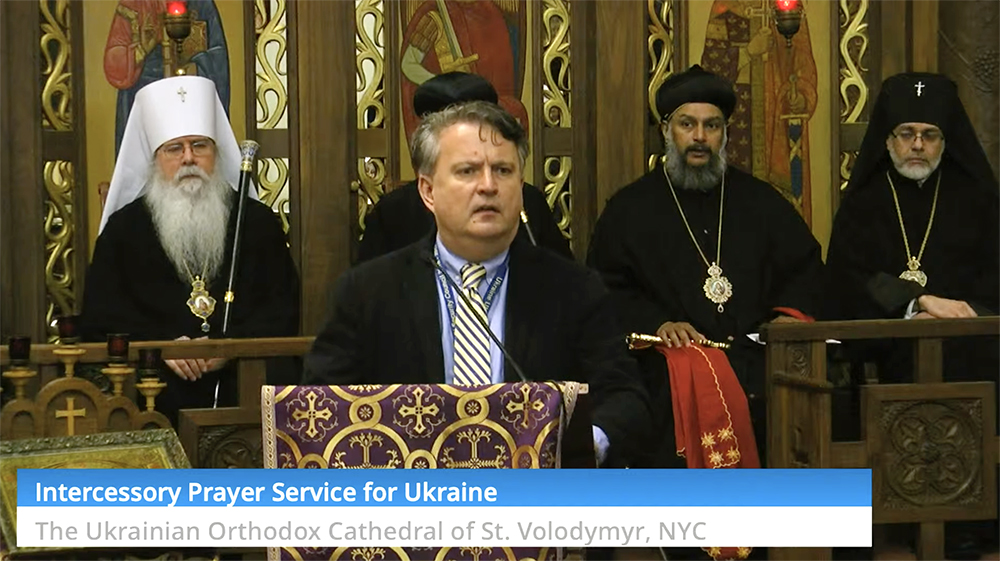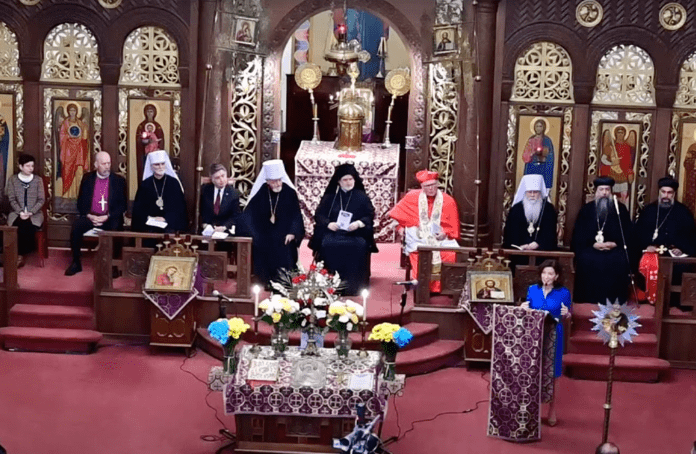
Sergiy Kyslytsya, Ukraine’s ambassador to the United Nations, speaks at the “Intercessory Prayer Service for Ukraine” at the Ukrainian Orthodox Cathedral of St. Volodymyr in Manhattan, March 9, 2022. Video screen grab
It was Sergiy Kyslytsya, Ukraine’s ambassador to the United Nations, who offered one of the morning’s longest speeches. Kyslytsya made headlines in recent days for telling his Russian counterpart that “There is no purgatory for war criminals. They go straight to hell.” The ambassador reiterated those remarks on Wednesday, referring to the Russian ambassador as a “herald of Satan.”
“I don’t know if it is really true — you can tell me,” Kyslytsya said, gesturing to the religious leaders behind him. “But I’m sure that if he doesn’t repent, he goes to hell.”
Stressing his own belief in God, Kyslytsya drew parallels between the biblical story of the Israelites leaving Egypt in pursuit of the Promised Land and Ukraine’s pursuit of independence.
“Today there is no man who, in the face of God, shall say that the Ukrainians haven’t got faith,” he said. “We will not fail this time. We will not fail ever because we believe in God.”
He closed by quoting Taras Shevchenko, a famous Ukrainian poet and writer: “Keep fighting — you are sure to win! God helps you in your fight! For fame and freedom march with you, and truth is on your side!”
When Kyslytsya finished, the crowd rose to offer a standing ovation.
Archbishop Elpidophoros of America, a prelate of the Greek Orthodox Church, spoke next. The leader of his tradition, Ecumenical Patriarch Bartholomew, played an unusual role in the development of Orthodox Christianity in Ukraine: After many of Ukraine’s Orthodox Christians declared independence from the Orthodox Patriarchate in Russia in 2018, Bartholomew recognized the new body — an act of defiance against the Russian Orthodox Church, which refused to.
Elpidophoros said the recent bloodshed in the region “must be set squarely upon the shoulders of Vladimir Putin … who is risking global peace for his own selfish political agenda.”
Decrying violence as sinful, Elpidophoros declared “no war can ever be called holy, or even just, in an attempt to rationalize it as morally acceptable.”
Like many speakers, he celebrated the “incredible courage” of the Ukrainian people as they stood up against the Russian invasion. But the prelate also lauded Russians who have protested the war inside Russia — a group that includes some Russian Orthodox priests.
They are “risking their freedom and perhaps even their own lives as they protest this unprovoked and unreasonable attack,” Elpidophoros said.
Archbishop Daniel of the Ukrainian Orthodox Church of the USA concluded the litany of speeches with a reminder of the human tragedy wrought by the ongoing conflict. He said that shortly before the service, he received a text message from an archbishop taking refuge in a church basement near Mariupol, Ukraine. The prelate informed Daniel that a hospital where “mothers were giving birth to children” had just been bombed. News of the attack broke during the service, with Zelenskyy blaming Russian forces and calling it an “atrocity.”
“He says the streets of Mariupol are covered with blood,” Daniel said, citing the text message from the archbishop. “Even though the Russian Federation has promised to create a safety corridor they have violated the promises over and over and over again.”
He asked those in attendance to stand and observe a moment of silence.
“Pray according to your tradition, regardless of where we come from — we’re all united in prayer,” he said.
As he finished, a group of seminarians began singing a hymn written in the wake of protests that rocked Ukraine in 2013-2014, with demonstrators rejecting a Russian-aligned government. The song, whose tones oscillate between inspiring and haunting, is meant to commemorate the “heavenly hundred” — or the first hundred or so protesters killed during the demonstrations.
This article originally appeared here.

